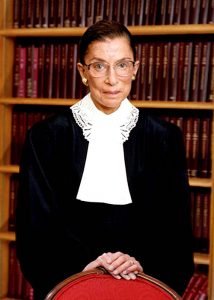Register for FY25
Full-Year Financial and Programmatic Results
For Justice Ruth Bader Ginsburg


September 21, 2020
It takes courage to stand for something. And even more to fight for what you stand for. And it takes a remarkable amount of courage to fight in a way that reflects a deep, abiding sense of honor, consistency and fairness.
What I admired most about Justice Ginsburg was the equity in her fight for equity.
Her first big case was a challenge to a law that barred a Colorado man named Charles Moritz from taking a tax deduction for the care of his 89-year-old mother. The IRS said the deduction, by statute, could only be claimed by a woman, or a widowed or divorced man. But Moritz had never married. The solution was to ask the court not to invalidate the statute, but to apply it equally to both sexes and she won in the lower courts. When the government petitioned the US Supreme Court, stating that the decision "cast a cloud of unconstitutionality" over literally hundreds of federal statutes (and it attached a full list of those statutes), it became the road map for Justice Ginsburg’s career.
As President Obama said, “Justice Ginsburg helped us see that discrimination on the basis of sex isn’t about an abstract idea of equality; that it doesn’t only harm women; that it has real consequences for all of us. It is about who we are and who we can be.”
That to me was the point of Justice Ginsburg’s lifelong fight against injustice and inequity—the idea that if we as a society treat anyone as “less than,” the entire underpinning of who we are as a people is at risk. Equity has always mattered a great deal to me—the simple (and apparently complicated) fairness in our treatment of people.
And equity has been the foundation for the work of The Fedcap Group since its inception in 1935—where our founders fought against discrimination in the workplace for people with disabilities.
Justice Ginsburg’s life and, possibly even more so, her death, are a challenge to every one of us. "Fight for the things that you care about, but do it in a way that will lead others to join you."
When great trees fall,
rocks on distant hills shudder,
lions hunker down
in tall grasses,
and even elephants
lumber after safety.
When great trees fall
in forests,
small things recoil into silence,
their senses
eroded beyond fear.
When great souls die,
the air around us becomes
light, rare, sterile.
We breathe,
briefly.
Our eyes, briefly,
see with
a hurtful clarity.
Our memory, suddenly sharpened,
examines,
gnaws on kind words
unsaid,
promised walks
never taken.
Great souls die and
our reality, bound to
them, takes leave of us.
Our souls,
dependent upon their
nurture,
now shrink, wizened.
Our minds, formed
and informed by their
radiance,
fall away.
We are not so much maddened
as reduced to the unutterable ignorance
of dark, cold
caves.
And when great souls die,
after a period peace blooms,
slowly and always
irregularly. Spaces fill
with a kind of
soothing electric vibration.
Our senses, restored, never
to be the same, whisper to us.
They existed. They existed.
We can be. Be and be
better. For they existed.
Maya Angelou
Share on
Share on facebookShare on twitterShare on linkedinShare on emailShare on pocket
-min.avif)


